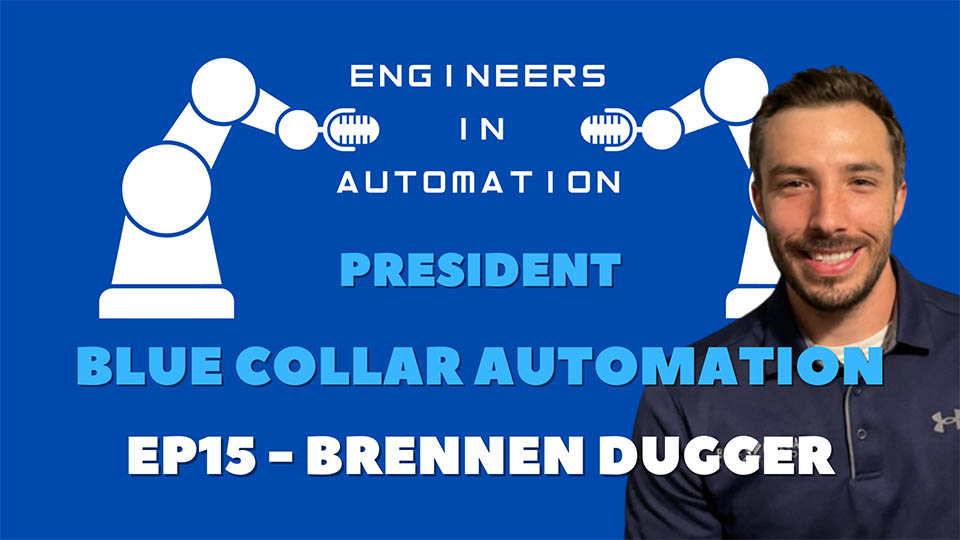Kaleb Travis | TNT Automation
Keegan Dillon • March 7, 2023
Engineers in Automation - Kaleb Travis | Episode 7
In this episode, we talk with the CEO of TNT Automation, Kaleb Travis. He discusses how he became a self-employed automation engineer only five years ago. Listen to our conversation about starting a business, finding new clients, learning on the job, and building his social media.
WATCH THIS ENGINEERS IN AUTOMATION EPISODE
Keegan Dillon – Host (KD): Hi, my name is Keegan, I'm your host of Engineers in Automation. On today's episode, we're going to be talking with Kaleb Travis. He's the CEO of TNT Automation. We're going to talk about how he got into automation. Some of the projects he's working on, work-life balance, and some of the lessons learned that he's had. Now let's go talk automation.
KD: All right, and welcome to the show. It's our first episode of the year in 2023. Here, I'm excited to have Kaleb Travis, he's the CEO of TNT Automation. Kaleb, welcome to the show.
Kaleb Travis – Guest (KT): Thank you. Thank you for having me. I'm glad to be here.
KD: Yeah, I'm glad to have you. Can you tell us a little bit about yourself? Give everybody a little background about yourself?
KT: Yeah, I am a major misfit in the automation community. People always give me a hard time because they're like, you know, you sure are a redneck nerd. You know, this doesn't really fit. But no, man, I just, you know, most people know I'm self-employed, I work. It's just me. I'm not really tied to any industry. And I do a little bit of it all. I do lots of Rockwell, lots of Siemens. Some PLC next stuff, I'm starting to do a lot of code assist projects. But I'm also dangerous with a meter in my hand, I do a lot of medium voltage, low voltage work, so and now I'm actually officially breaking into the SCADA space. So first bit of hosting coming up, which I'm really excited about, and it might not just got my hands and a little bit of whatever's available. If a customer needs help, I'll put my hands on it, you know.
KD: The man does everything. That's great. So how did you get your start in automation? Did you get a degree? Did you do training? How'd you start?
KT: Yeah, actually, to be completely transparent with you. It was on accident. I was working on a drilling rig at first. And then when they stacked our rig out and sent it to South America, I decided I didn't want to go to South America. So I had gone to Panola College, which is a little community college here, and put no you know, in Carthage, and I was going for petroleum technology. The Director of the Energy Department was like this was, I think, the semester before I graduated, it's just an associate's degree, nothing, nothing crazy. He was like, “Hey, have you heard of ENI?” And I was like, “Well, what's that?” And so of course, that answered this question. He said, “Well, don't worry. It's a four-class difference, you should really take it before you graduate, and it’s like, an extra semester. I said, “Okay.” And so I did. And it was basics of PLC, motor control, some basic electrical and, like one other class. I mean, it wasn't much, you know. And this sounds crazy, but what got me was almost everybody failed the basics of PLC course. And that's really where my love of like, I knew, I was like, “Okay, we all almost failed this. Some special about this, you know?” So that's, that's kind of what got me on that path. And I had got offered an internship right out of college. But one of my questions was, “hey, you know, I've been working with these PLC things, I want to keep doing that.” They were like, “no, you have to have a master's in either electrical or mechanical or some type of engineering to program that.” My uncle at the time he was had been working for Shell for like 30 years. He said, “Look, that ain't right. You can find a company that will let you get your hands on” and he said, “anybody could be an instrument tech, anybody can calibrate an instrument. Check with a boat, man,” he said, “but it takes someone special to read some complex code from scratch.” I don't know, you know, in my eyes, he was such a big, big wig. That was what set me on fire. And that's kind of what led to this whole, I mean, it was all completely on accident. Really.
KD: Wow. That's great to see. And, and I and I liked the nonconventional way of getting there. Sure. It's really cool. You know, so you did mention you are self-employed? Can you tell us a little bit about that? How'd you get to that self-employment it sounds like you work somewhere else at first, you know, your first couple jobs, and jumped into it.
KT: Yeah, I've worked in the field got the past. Oh, man, this is bad to admit, but like really, the only past the past five years or so? I mean, I've only been in this field for maybe almost six years. Six and a half-ish years now. Okay. I worked for several people at first, it like we did programming, but it was more spec by the customer. We just made it site specific. We did new installs but never live sites so I got a ridiculous amount of experience doing that. And that's like where I honed my attention to detail attention to good install, wiring and cables all that. And then once I kind of maxed out there, I knew like, hey, I want to take this further. So I worked for some people for a while that were crazy. That took a chance to let me program from scratch and that was a whole nightmare. I mean, really, anybody from the San Antonio AWC team can attest to that because I think I was calling those guys on a daily basis having a panic attack, you know? So shout out to Matt Paulsen and Aaron Mooney they really taught me a lot and helped me out a trial by fire. I tried working at a plant for a while. I think I was there for a year great company, great people. It just maybe wasn't a fit for me. Because by that time I had started working for that plant. I was pretty deep in my automation knowledge and was pretty good at getting good at programming, you know, was pretty self-sufficient in programming. And I just I don't know, I'm too ADHD to do the same thing every day. And so did that. And then, man, it was really a God thing. Me and my wife. We've always been real good with money. We've been saving up you know, we had a nest egg and then right around that time the guy we had a nine-second Pontiac GA, it was a Hellcat killer. We were racing it pretty religiously. The guy bought it from had offered to buy it back for a significant amount more than we had purchased it for. And the moment that happened, customer X, who I can't say yet because this project is still ongoing in some ways. Josh Varghese at Traceroute had reached out to me said, Hey, I need a four week contract. It's not much but it would be enough to get you going. And so my wife and I, we sat down, we prayed about it. She was like seven months pregnant with this came up. Okay, so we sold the car. We took the money from the race car and the money we had saved up and gosh, she's, she's the real deal, because I went up to Ohio. And she had a pack like her and my dad and her mom and all them. They packed our whole house up in Lubbock. We were seven and a half hours from home, they moved her in my one and a half year old to her mom's house here in East Texas. And my four week contract ended up turning into a 10 week contract. So I was in Ohio for 10 weeks straight. And we just never, we just never turned back on it.
KD: Yeah. Good. Well, congrats. Can you tell me a little bit about your business? How'd you come up with the name that you have?
KT: Yeah, so actually, my first job in this field I did with my dad, and he doesn't have any automation experience, but he can do like, the man is insane. You know, he's the smartest person I know. He's very good with details, and he's a perfectionist. And so I figured there would be a timwhenre we might continue to do more jobs together. And so I was like, okay, my last name is Travis. And I thought, well, Travis and Travis. And that's really all it is Travis. TNT, and that just it stuff. You know, it first I had like this really cheesy logo and this horrible, cheesy Orefield slogan. It was like affordable rates, explosive process, and it was cheesy, but the customers loved it, you know, awesome. So I thought it was great. And then when I got out with some other customers, some other stuff I'd worked on. My wife was like, “Hey, you really got to drop the, the cheesiness.” And it's like, it's time to get serious, you know? And so that's kind of how that all came about.
KD: Well, good for you. Yeah, your website looks great. We'll have it posted on the, in the description. So if anybody wants to take a look at it, they can go check it out.
KT: Yeah, before y'all do that, I made that okay. And I'm clearly not a web designer. And I really need to update it. I have a lot of projects that aren't on there yet. I really need to get on there. But all the pictures on there are all from projects. That was one thing I wanted to do. I want every picture on there to be something I've had my hands in. So that is the one cool thing.
KD: And that's important. I think it really shows authenticity. And I think that's good that you're doing that. Yeah. And then what are some of the you know, your future goals as a you know, a self-employed business owner? You looking to grow? What's kind of what's kind of the plan?
KT: Yeah, actually, that's kind of like what my life has been concerned with lately, where we're at for a while I was thinking about hiring and going that route and growing but really, from what I'm experiencing and saying like, even if you're a larger integrator I know some great integrators are the best with the date like the headaches are just there. We don't have enough people in our industry that have the experience to make a large firm to me for what I do be worth the headache, so man, actually I'm subbing I'm doing a completely different route I sub some guys like Davide over at IOT, James Joy, Josh. Obviously some people I trust with my life that are just top notch you know tip of the spear top of guys can really do some crazy stuff and that way when we have bigger projects I know they're doing it it's a level I do it and their case sometimes better. Right? And I'm focused in my you know, I've always about I'm a go getter and I'm always trying to do the next thing so to grow that income I'm actually starting up like going to tax sales my wife's uncle he's on a tax sales and stuff they find these people that don't pay their taxes and sell property or land or whatever it is and I'm trying to get started some Airbnb is going, we've had rental property in the past, and we did really well on that. I don't know that I will Want the headache of full term? Renters again? So that's kind of what I like about the Airbnb, have a company service it out and just keep it rolling.
KD: Yeah, good for you diversify. That's key.
KT: Yeah, yeah, I'm just looking for different ways to get passive income without necessarily having employed people. And really, I think the hard thing for me is, I don't mind being like, there's times where I get stuck on something. And if I have to stay there, 18 hours straight to fix it, I'm gonna stay there 18 hours straight to fix it. And it's not really right to ask that of somebody else, you know, but my customers love that. Like, they love that service. So it's just, I don't know, maybe I'm stubborn, but I don't want to give up that quality aspect. I just not there. It's just not there about them when it takes. So maybe that'll change in the future. But for right now, I'm just focused on using a handful of people that are some of the top in the business and providing good solutions for our customers.
KD: Well, congratulations on that aspect of it. And he kind of touched on it there for a second. So I want to I want to hit this. So who are some of your clients that you're working with?
KT: Ah, well, okay, I can't I can't say current names. There's a couple of reasons for that. But I'll tell you the, the industries, you know, and it's, obviously I have my normal oil and gas. I can say this that. I'm not gonna say the name. But a lot of you people that were following me last summer, I was posting very heavily I wrote the code for and commission and I'm still working on the second largest grass cleaning facility in the nation. As matter of fact, the phase we did last year is the only facility in the nation that was there cleaning Kentucky Bluegrass, it 98% Purity at 25,000 pounds per hour. You know when that when the season started up, they were having like 50 18 wheelers, a day show up and dump are all seed on the ground straight from the fields. And we will just send it as fast as we can. So that guy keeps me busy year-round, we're always growing and always add, he's got several different lines, and then my oild and gas customers. I just picked up a really big PIO and the food and beverage industry, that's gonna be a game changer. That's the first time a customer has ever cut me loose and said, “Hey, we want you to architect it from scratch.” So everybody knows availability and products is an issue right now, you know, so I'm not your typical Rockwell house, I do obviously do a lot of Rockwell will work. But I tried to base my solution based on what fits the customer best. So we were able to build out a solution where every single part of the solution is available. There's backups on the shelf, there's no backorder on any of it all open source very secure. And it basically is built in a way where the customers ability to scale is limitless, you know, they can take it as little as they want or as large as they want. I'm, I'm really excited about that. There'll be a lot of posting going around that.
KD: Yeah, looking forward. Looking forward to seeing that. And then on that note, you know, you've kind of been talking about these things, but what are some of the likes that you enjoy about being in this automation industry?
KT: Man, I really, my wife will attest this because when I get on something, I'm stuck. Like if I if I get something and I can't get it to go my way, like the way it's supposed to go, I won't leave it alone until it's right, you know, and that kind of translates over into the field. My customers love it. Because it doesn't matter what time of night or day it is, if I'm on it, we're on it. But religious, I love problem solving. When I first started into this, and old man had said, you know him and his wife were actually in the field. And he said, “When we learn how to troubleshoot the right way. Start thinking like the troubleshooting thought process translated to every aspect of their life.” And I didn't really know what he meant back then. But I see that now. Like, doesn't matter if I'm working on a system or my kids bicycle, right? Like if someone's not it's, it's instantaneous to the methodical thought process and I just enjoy it, man. I like tearing problems apart and finding solutions for them. I like diversity. I haven't been on a project yet. It's the same. You know, every single project I get on is different. I really like that, because I'm so high-strung and add. I get bored. He's rad. So, like the fact that they're all different.
KD: I think I think a lot of people are in the same boat as you is where they like to see the different projects. And that's the one thing about you know, contracting, being self-employed that you do see a lot is different applications, different customers, unique projects. No project is the same. So, I think that's something that everyone in this industry really does enjoy. I know I do myself, on that. What about some something you don't like? What about the industry? You know, what do you think we could improve on? Yeah, you know, what do you see?
KT: Man, there's a lot of the deal with this a lot and I used to hate it. Now, I actually look forward to it because I know once I show him like we're the real deal. They always end up it changes things but like just being stuck. There's a lot of people stuck in their ways in this and like especially not calling and older people out and I get where they're coming from, because I see a lot of young kids coming in, they don't know what they're doing. But there are times where I'm on a project where the customers held up because their normal guys way older and he doesn't want some young kid telling him how to do different. And then days go by and time is wasted. Finally, the customer breaks and says, “Here, try it your way.” We do it and it works. And they're like, “Whoa, dang, we just wasted four days,” you know, and we got to get past that. You know, I mean, if you look at like software development side of things, compared to like, specifically PLC code, we're so far behind with, you know, version control, source control all that it's just commenting, you know, it's all it's all way behind. We're stuck in a typical way of doing things. And I think, is bad as it sounds like as bad as availability. And all this craziness we're seeing as I think it's really starting to blow people's eyes open, because they're having a try different solutions they normally wouldn't try. And for guys like me that quote a lot off the wall stuff, that's great. But they're saying like, hey, we don't have to spend, you know, seven grand, well, we had this conversation today, we were looking at, I'm not gonna say their name, but y'all know, they are one of the major players, one of my customers has their their processor, and it wouldn't do a long reel. And this is a $7,000 controller. So we had to do a calculation that works with the precision of the floating point to make it keep going and blah, blah, blah, I'm not going to get into all that right now. But there is a processor on par with it for Siemens, for a 10th of the cost that would have done it. You know, it's just crazy that we're in that industry where a $1,400 controller can do to $7,000 controller do and people are still buying the $7,000 controller, because it's what the rest of the whoever's using, you know, it just drives me crazy.
KD: Well, and I think that's part of the thing, too, is getting some of these customers up to speed with the current latest and greatest. And I'm sure you've seen, especially on the industrial side, some of the stuff, you know, they're everything's outdated and, you know, maybe they aren't using the newest technologies. Yeah, you know, I'm sure you're seeing a bunch of that as well.
KT: Yeah, I was at a customer shot the other day, I was quoting a retrofit, and they have a slick five. And it's still running, old reliable. But you know, but he said, another integrator had come out and said, like, “it would really inconvenience you if this thing went down.” And I was just like you know, like, really inconvenience is a slight way to to put that, you know. What's really gonna happen is you're gonna be down for months, if you're wanting to do it directly, just stuff like that, you know, I don't I don't know. I think there's so much of this secrecy crap. Everybody thinks they've got some proprietary going on. And people lose sight of like, it's really about what's important for the customers need, like people lose sight of that, like, let's focus on the solution needs to be based on what is best for the customer. And what is best for their situation. No, nothing else matters. You know, I think that's why a lot of vendors don't like me, but my customers love it. Because I'm not vendor, I'm not going to be vendor specific. Never have never will be. And a lot of people told me the beginning, like, oh, you can't do that you need to go get a vendor, and they'll feed you work, otherwise, you're gonna starve. And I can say for anybody out there that doesn't want to be vendor lock. That's not the case. If you're honest, do what’s right, you know, work hard, the rest comes.
KD: You're absolutely right. And good for you for sticking to your guns there. I want to touch on a little bit, because I know you're a workaholic. I myself am too. But how do you balance that with the rest of your life? I know you got a family as well. So how do you do the work life balance? What's that mean to you?
KT: Yeah, honestly, I think that's just a good thing that I'm naturahigh-strung. Because I get off work. And I'm still like, ready to go bang, bang, bang, you know, whatever we're doing with my wife and kids, you know, and I don't know that I always be that way. But I've been in that way my whole life. So I don't know. It never really feels like, I don't feel like we're sacrifices matter of fact, and my wife, she's the one that confirms this right she tells me all the time. Like, we have such a good thing go and like thank you for saying, you know, because sometimes I do worry about it. Like, am I too stuck on this? But I don't know just even the days I feel tired, I just suck it up. I'll feel tired and like slouching on the couch. And I just realized like, this is not their fault. You know, they need their time and I'm gonna suck it up. I'm gonna get off this couch. I'm a gonna do what, I need to do. Some people are always like worried about like, Man, you've been traveling. But yes, I travel. Like if I had to do the thing where I was gone for 10 weeks in a row again, that would that would really be not good right now. But I get these jobs all the time where I'm gone for three to four days or maybe a week at a time. That's great. Because like me and my wife have a chance to miss each other. If I was home all the time, I would drive her nuts. I'm way too high-strung. You know, my kids miss me. Dad's all the sudden the coolest thing on earth when I get home. It's just a good balance. I'll be home for a long time working. And then I think that it almost just it really is a good ecosystem because by the time I'm starting to get burnout, working from my office every day I'm out of town for a few days, and then I'm ready to be back home. And just having that balance helps. So I don't know, I don't. I think that's another reason I don't really want to bring on employees. Because if I brought on employees, then I think I would have to, I would have to focus so hard on what's going on over here, I'd have to sacrifice here. And at this point, man, since I haven't been sacrificing and had a good taste of this balance, I won't give it up. We invest heavily in our retirement account. We have other avenues. We, we do a lot, we’re grinders, you know, my wife owns a business too. I wouldn't sacrifice the time I have with them right now for nothing.
KD: Good. Well, you know, congratulations for your wife to that's, that's great. Yeah, it sounds like you both are very self-motivated people. So it's awesome to see in a power couple like that. So congratulations there.
KT: I want to give her credit on that, like just in case this help somebody out. Here's, yeah, if you're gonna do this, if you're venturing out and you're married, or if you're not, and you're thinking about getting married, you know, you need someone that's on board because like, like I said earlier, when we moved and I quit my job, my wife was eight months pregnant. Okay, I'm not a bath person, like I take showers. But like, I can remember a two-week period, where I would crawl in her bathtub at 12 in the morning, because I was so anxious, I couldn't sleep and just sit hot water for hours. That sounds weird. But like I was so anxious about what we were doing. And so nervous, it was eating me alive, and she never, I don't know, it's like she never skipped a beat. She just had that trust. She always had faith when I was like that myself, she would speak kind words, and I knew she meant it. So if she wouldn't have been supportive, like I wouldn't have done it, because you won't make it if your partner's not on board. It's just not going to it's too much. That first year and a half, which I'd like to touch on in a second is a monster. You know, really, because nobody really explains. You're not just solving automation problems anymore. I'm learning accounting. I'm learning tax code. I'm learning like invoicing, oh my god, I screwed up, my first invoice is so bad. And if I didn't have Josh, and the, you know, the product manager on the job we were on, he was aware they worked. They could, I could have screwed myself to death. And they didn't allow that to happen. And luckily, they were just great guys and helped me out. But I mean, dude, I had to learn all that, you know. And there's a lot that first that first year and a half is either going to make or break you. And that's all there is to it. I had a guy owed me a significant amount of money for 75 days. And he knew I had two kids at home. That nearly I think that's the closest I've been. There were days that that my heart was just gonna stop beating. Because we had just bought a house. I had my kids, we were home finally. And we were about to sink. I could see it. I could see the accounts coming down, you know, but luckily, we had been diligent with our money and had that money to float us and but I mean, it got scary low and that was hard. And now we're way past that, right? We've, we figured that out. I've learned it's okay to fire a customer if they're not gonna be a good customer. And I don't know, you just got to be good with money. Man. If you're gonna get into this, you have to be good with money. Yep, you can go blown it.
KD: Yep. Great, great point. And in on that. You're good with money. You're also good with social media. You know, how did you get such a great following here? What's the secret to your success? Do you think?
KT: Yeah, I don't know lots of prayers. Really. I mean, seriously, just in just sticking with it. I think a lot of people get on LinkedIn. And it's typical. Rather, connections are so boring. They don't post anything. And they think it's a dead end. Well, I felt the same way. I just started taking pictures of my posts, videos and my work and posts. Now there's, there's things here I don't really ever talk about, like, there's keys. I don't ever post a customer's name. I don't ever post details that could get me in trouble with the customer. You gotta be careful about but I found all my customers are my connections on Link. Everything I post my customer see, you know, and I've never had any backlash. I check with them, make sure it's okay. But a lot of them came to me from posts, they know what I'm doing. You know, they know I'm good at what I post but 99% I only have had one contract that I didn't get from LinkedIn. Literally. And I have worked for I can't name projects but you know, I've worked for Amazon, Nestle, some back woods Tesla stuff. Just some I can't name I really wish I could name you know, I was on a project with like three and a half miles of conveyor belts 1800 drafts 60 control panel, I mean, just monstrous where I haven't been able to post about any of that yet. But it's coming one day it's coming.
KD: Okay, looking forward to those posts as well. So, what are some of the lessons learned? It seems like in a short amount of time, you've got so much experience so many different customers, so many different types of projects. What are some lessons learned? Lessons learned that you've come away with?
KT: You just gotta be straightforward. I think that's the biggest thing. When I was when I first started out, it was really hard for me to mess something up and own up to it. Not that I didn't mind like being responsible, but like, Yeah, how did you get into the program and you're responsible for a lot more critical things than you are if you're just troubleshooting an instrument, right.
But I did like I remember one time I had to call my boss because I blew up somewhere. I had transmitters literally, like, you know, it was it was that we had been using the certain types of transmitter whips built in. And this was when I was really new, right and it we had swapped two different transmitter, but he didn't explain to me like, “hey, the transmitter is now in there to third party piece,” I just hooked it up to a half inch nipple and thought I was doing the right thing and sent it. And I'm walking away from the weldhead to the HMI and I’m hearing boom, boom, boom! You know, and I look back and these OleumTech pressure transmitters are blowing and gas, and you know, it was blown out. The truck driver was waving like, “Hey, shut the welding off.” And so, you know, obviously, that's a terrible phone call you don't ever want to have to make but I did I had to call my boss and say, “Hey,” I'm not gonna say what I had to say. I screwed up is a nice way to put it. But I did. And you know what? Obviously, that was an awkward moment. But it went so much better for me just being straight with him instead of trying to beat around the bush because there's no beat around the bush. Right?
KD: Yeah, just being honest.
KT: That's it. And the reason I bring that that point up is because I see a lot of customer downtime, that that stems from either their techs not being real with them, or their integrator doesn't want to tell them they did a mistake, right? Some stupid sometimes. But now we're costing the customer don't just be real. And don't think you're the smartest person in the room. It's okay to not be the smartest person in the room. Listen, keep your ears open. And I think the biggest thing that I really struggled with was, there were times I knew something wasn't right. Or in my head, I knew it. And I would keep my mouth shut or like try to say it, but not really try to say it. Because the people in the room were older than me and smarter than me and been doing this longer, and knew they didn't want to listen. Finally, I just started speaking up. And there were times you know, it was awkward a lot, they would look at you like yeah, whatever, whatever. But when it comes out, now they respect you, you know, now they're listening. And it really doesn't matter what your age is, what's your experience, if you know something's right, or if you know something's wrong, could be, you know, something's wrong, but you're the other people want to do it. Speak up and say something, you know, don't do something if you know in your heart like, “Hey, I know this is not right.” Don't do it.
KD: Yeah. Well, that great. And honestly, it my next question was some words of inspiration for somebody, you know, in your footsteps thinking about doing the controls engineering, getting into automation? What are some inspirational words, but I think you just kind of summed it up right there. I mean, you know, speak up, tell the truth. You know, be honest with your customers. If, if you see something that's wrong, say it, you know, so you kind of just touched on everything I was just gonna ask.
KT: Yeah, in really like, if you're getting into this game, like reading is great. But doing is better. Read a lot, you know, read what you learn it. But then like, try to put what you're wanting to do to like get, I mean, dude, you can go to get a Raspberry Pi now and download Code Assist to it like, you don't have to have a control logics or a Siemens or some sit on your desk, go get your Raspberry Pi, come up with a problem you want to solve, and try to solve it. You know, we have all these Modbus simulators and stuff like OPC simulator clients, you can download so many free tools and whatnot. And just try it, you have to do it for yourself. You get stuck, posted. I post stuff all the time. It's like “oof.” I remember when I first got on LinkedIn, I would post questions and be like, do I really want to post this people are gonna think I don't know what I'm talking about. But I posted it anyways. And the feedback was so much better than I thought people didn't treat me like that. They were willing to help and they were excited to help. And that's when it really started coming on from us. Okay, there's something to this platform here.
KD: Yeah. And it's such a great community. Like you said, you can reach out ask people questions, make connections, meet, meet new customers, you know, meet new business partners. It's a heck of a great platform. Before we end here, I guess where can everybody find you? LinkedIn obviously. Where can people reach out to contact you?
KT: Yeah, that's really the main one, right? I have my website, my email and all that stuff. So my LinkedIn bit of work, I try to keep my personal stuff out of my LinkedIn just because I have my whole personal life, right. I try to keep the two separate. So I mean, but dude I'll talk integration automation with anybody and they just hit me up on LinkedIn, you know, that's the best way to do it.
KD: Great. Well, thanks again for being on today's show. If you guys enjoyed the episode, please give us a like, a comment, and share. And we look forward to having you join us next time here on Engineers in Automation. Thanks!
KT: Yeah, I appreciate you having me on the show. Thank you enjoyed it.
KD: Thank you.
If you enjoyed that podcast episode, get more information below!
CONNECT WITH OUR GUEST:
Connect with Kaleb on LinkedIn here.
THANKS TO OUR SPONSOR:
Want to learn more about JOINER Services and their engineering service platform for contract engineers, you can find it here.
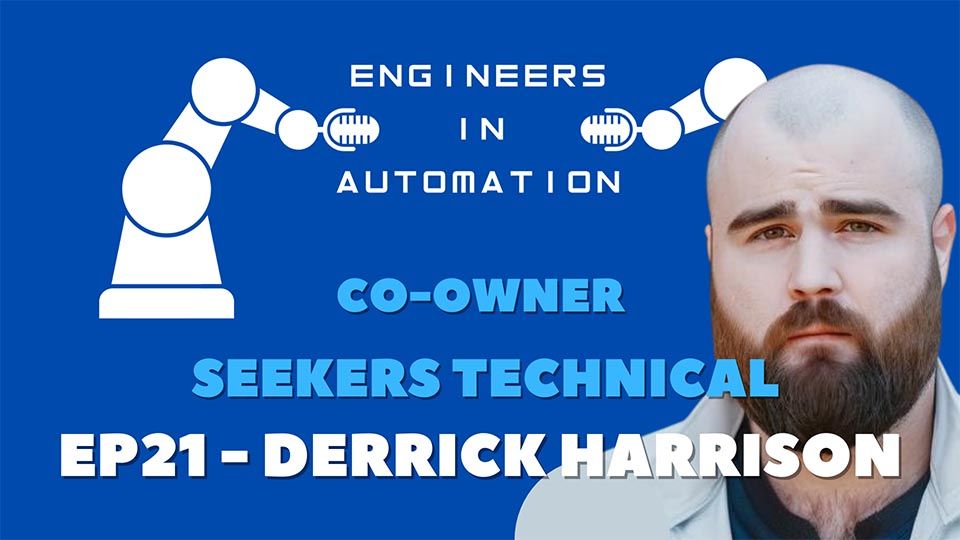
In this episode, we talk with Derrick Harrison, the co-owner of Seekers Technical. We talk about what makes his company unique compared to other staffing and recruiting firms. We discuss the onboarding process for clients and employees. We also discuss some of the lessons learned and mistakes he’s made as a new small business owner
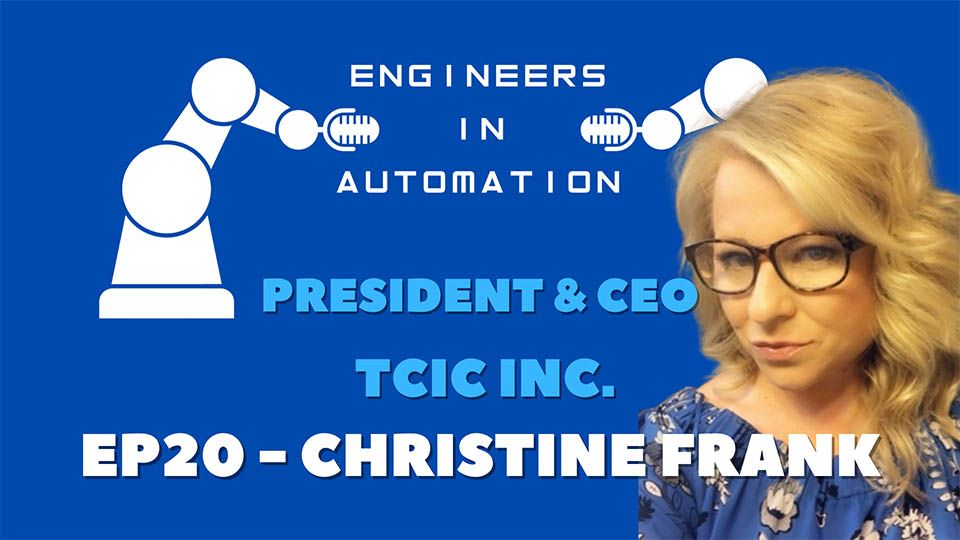
In this episode, we talk with the President and CEO of TCIC Inc., Christine Frank. We have in-depth conversations about how to buy a business. We talk about the struggles that occur when new management takes over and how to keep employees happy. We discuss why she chose to purchase instead of going back to work for someone else, and we talk about the biggest challenges she’s faced as a business owner.
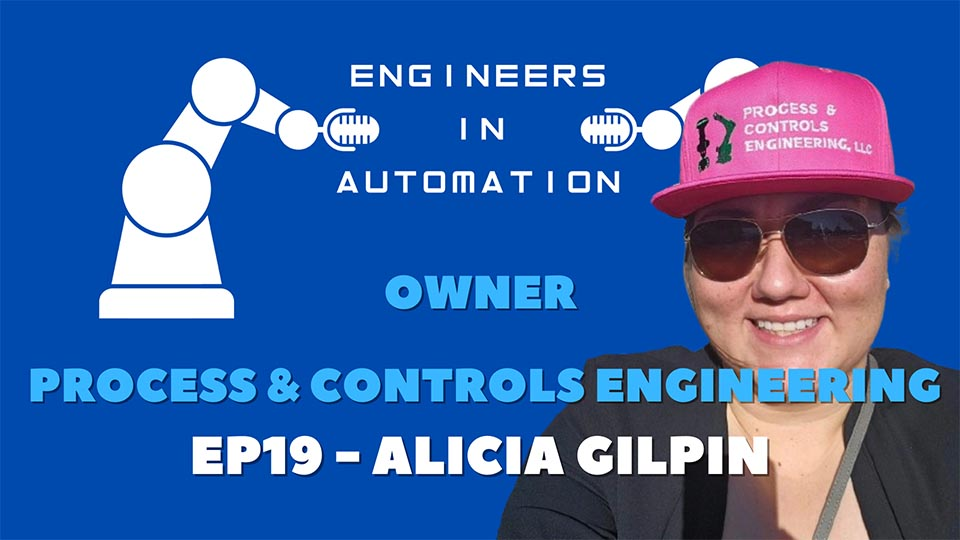
In this episode, we talk with Alicia Gilpin (Ali G), the owner of Process & Controls Engineering LLC. We discuss how she started her career in automation, coming from a chemical engineering background. She discusses why she decided to start her company and how she plans to continue to build it. We also discuss her automation podcast and her way to get more kids involved with automation, through her non-profit organization.
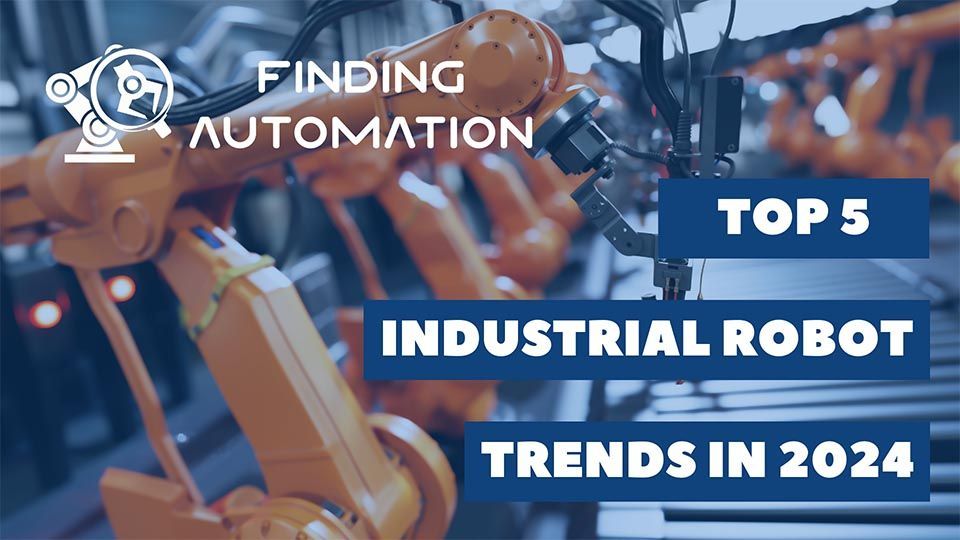
Top 5 Industrial Robot Trends In 2024 Robots are becoming more sophisticated and skilled as robotic technology advances at an extraordinary rate. From industrial manufacturing to food and beverage and pharmaceutical, robots are being used in numerous industries to automate what were once manual tasks by improving inefficient production lines and enhancing overall productivity. With the year 2024 upon us, it's worth looking at the top five industrial robot trends that we can expect to see in the coming year.
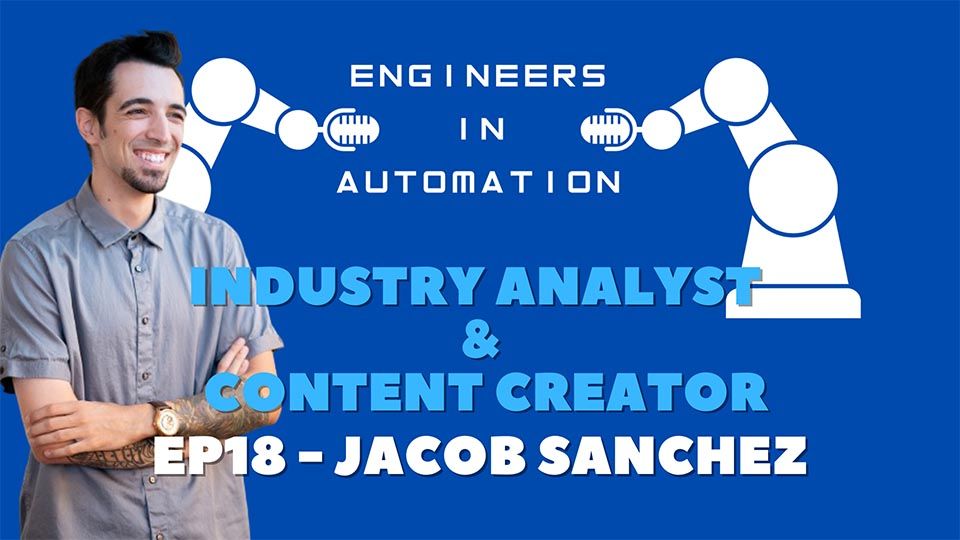
In this episode, we discuss with Jacob Sanchez how he got his start in the automation industry. We discuss why he thinks his social media following has grown so large and how to build your unique following. He also talks about becoming more comfortable in front of a camera and gives a few tips on public speaking. We also discuss his future plans for helping the younger generation get involved with manufacturing and automation
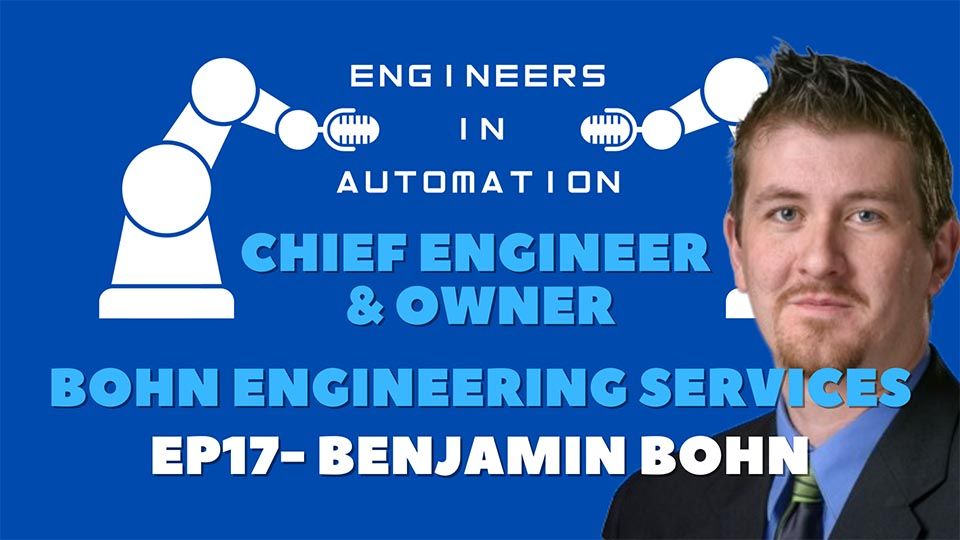
In this episode, we talk with Benjamin Bohn, Chief Engineer and Owner of Bohn Engineering Services. We discuss how he built his side gig, into a full-time engineering service business. We also talk about what he likes about being a business owner and some advantages he gets to enjoy during his free time as the owner of a company. We also talk about building his social media presence through memes.
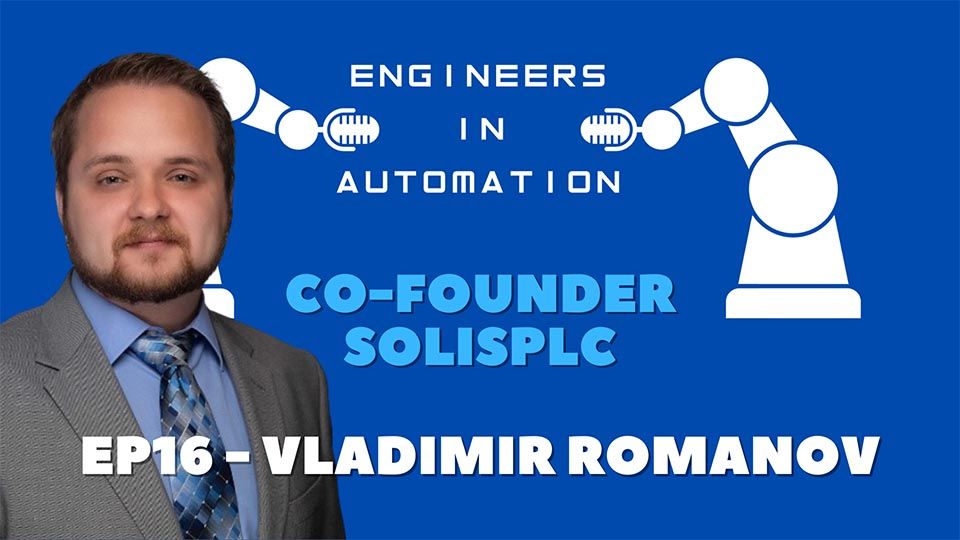
In this episode, we talk with Vladimir Romanov, the Co-Founder of SolisPLC. We discuss how running a blog and creating helpful YouTube videos then became an online PLC training company. We talk about the different types of online training programs offered and what he likes about being the owner of his own company. We also discussed how the current economic burdens affect companies' training budgets.
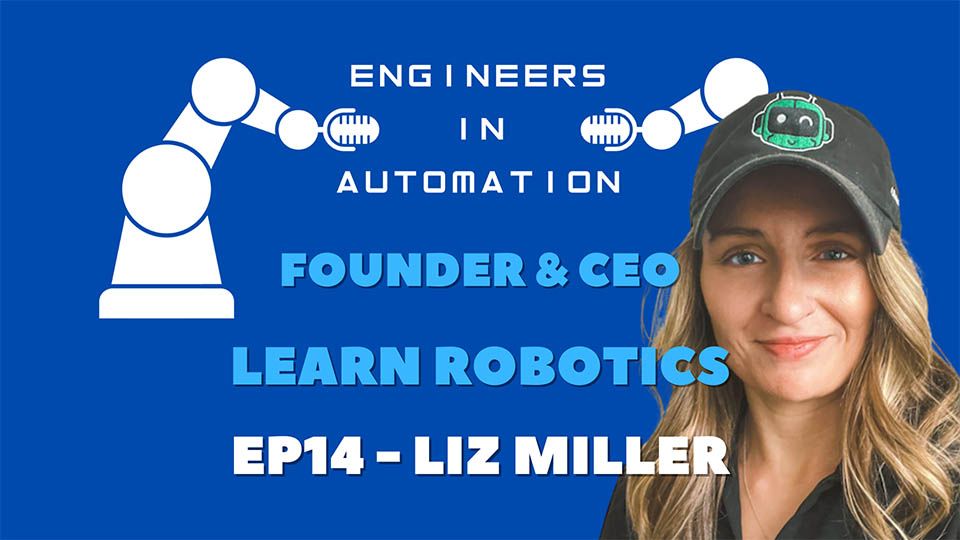
In this episode, we talk with Liz Miller, the founder and CEO of Learn Robotics. We discuss how she got into automation and robotics and how she has grown her automation coaching platform. We also discuss the coaching paths her course allows the clients to pursue to improve their automation careers and how to prepare to land their dream automation job. We also talk about the future of the robot and automation industry.
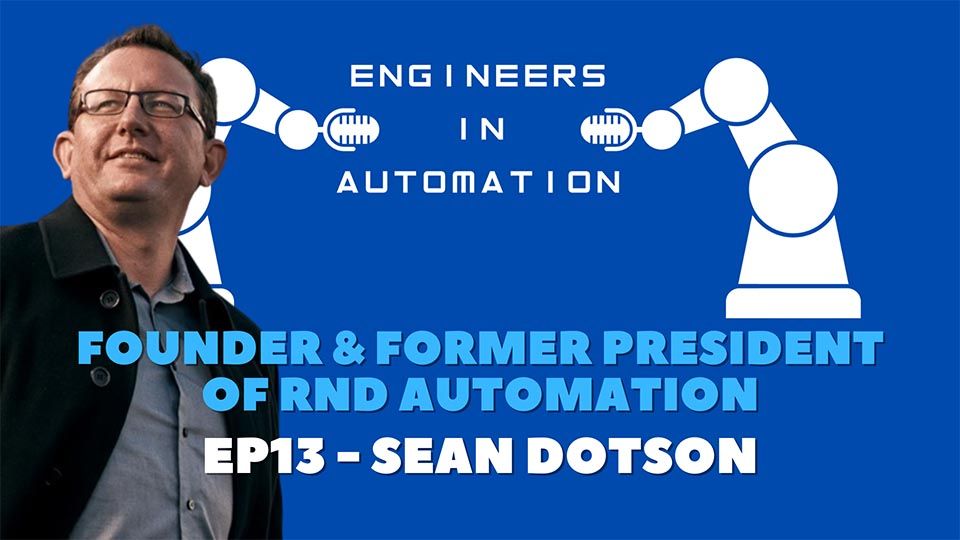
In this episode, we talk with Sean Dotson, the founder and former president of RND Automation. We discuss the automation industry in Florida and what lead him to start an automation company in his home state. We also discussed his likes and dislikes in the industry and what advice he would give someone interested in the automation industry.

